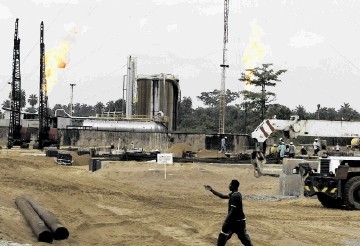
Nigeria’s oil production has dropped again as a third major crude-export facility was disrupted, this time by accidental damage rather than militant attacks.
Exxon Mobil has declared force majeure — a legal clause that allows it to stop deliveries without breaching contracts — on shipments of Qua Iboe, the company said in a statement Friday.
The Bonny Light and Forcados oil grades were already disrupted following militant attacks. The three facilities ship more than 700,000 barrels a day.
“We expected more supply disruptions out of Nigeria this week, but the pace of new supply problems from that country beats our expectations,” Olivier Jakob, managing director of consultant Petromatrix, said in a note. Production may not be much above 1 million barrels a day, he said.
A resurgence in militant attacks in Nigeria’s oil-producing region has cut output by as much as 600,000 barrels a day to 1.4 million a day and “massively diminished” the nation’s income, Emmanuel Kachikwu, Nigeria’s minister of state for petroleum, said Thursday in a broadcast on Lagos-based Channels Television, before the disruption to Qua Iboe.
An armed group calling itself the Niger Delta Avengers later warned of more attacks to come.
Brent crude has risen 5% this week to $47.64 a barrel yesterday as supply halts in Nigeria, wildfires in Canada’s oil-sands region and declining US output combined to curb a global surplus. The international benchmark has risen more than 70% since hitting a 12-year low in January.
Attacks on oil infrastructure caused Nigerian production to drop to 1.69 million barrels a day last month, the lowest in 20 years.
The nation’s output hasn’t fallen as low as 1.4 million barrels a day on a monthly-average basis since 1989, the data show. The supply reduction is compounding economic problems caused by the slump in crude prices.
A subsea pipeline linked to Qua Iboe was damaged by a drilling rig, Exxon said Thursday, without giving an impact on shipments. Shell declared force majeure on exports of Bonny Light crude Wednesday following the discovery of a leak on the Nembe Creek Trunk Line.
Attacks had already halted shipments from the Forcados terminal and the Okan oil platform, which feeds into the Escravos export terminal.
Nigeria deferred at least seven Escravos cargoes scheduled to load in May and June, according to revised loading programmes obtained by Bloomberg on May 10.